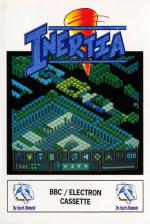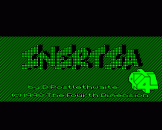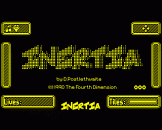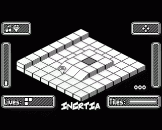Introduction
Inertia is a totally original game with a huge landscape just waiting to be explored. It is available for the Archimedes, BBC Micro and Acorn Electron. Scattered (or rather fiendishly placed) around the landscape are many special tiles which need to be collected. Your highly sensitive craft floats freely around the landscape and you must exert forces upon it to guide its speed and direction.
You have a three dimensional viewpoint displaying a tiny fraction of the total playing area. There are walls, bridges, tunnels and ramps to negotiate and a host of mystery tiles with strange properties indeed. These include ice, jump and transformation tiles. There are even certain tiles which alternate the controls so that everything works in reverse!
This massive game has been very carefully put together and solving the puzzles within it will need lateral thought and a lot of dexterity.
The Archimedes version is considerably enhanced with digitised sound and music. It even features a full colour three dimensional map of the game which is a joy to wander around. You'll certainly be amazed at the size of the game and the variety within it.
Inertia is a game for the determined. Each version makes full use of the ability of the computer so make sure you've got plenty of time to spare. Once you have started you won't be able to stop.
Game Objective
The aim of Inertia is seemingly quite simple. You must guide your craft over all of the shaded tiles whilst avoiding falling off the landscape. The landscape is made up of a very large number of 3 dimensional varied screens. However, as you progress, the going will get very tough. A good memory and/or mapping will certainly be needed.
Playing Guidelines
Various icons along the top of the screen depict the sound status, which craft is in play, pause on/off, and the current direction of the controls (normal/reversed). The two vertical bars at the sides of the playing area slowly fill up, first the left, then the right. If a shaded tile has not been collected before the time elapses then you will lose a life. The timer is reset each time a tile is collected.
The panel to the lower left of the playing area shows the number of lives remaining. A life is gained for each tile collected, and a maximum of 12 lives is allowed. The panel to the lower right of the screen gives an indication of the number of tiles left to be collected. Your current score is shown above this. You score five points for each tile collected and you lose three points for each life lost.
When you lose a life you continue the game at the place where you last collected a shaded tile or sometimes at the last but one.
Special Tiles
The further into the game the craft progresses the more features it will encounter. Most tiles are easily recognisable - some you will have to learn by trial and error.
| Ice | It is important to alter the direction of the craft whilst on this | |
| Jump Tiles | The craft is thrown into the air | |
| Checkered Tiles | The craft loses control of its brakes | |
| Vertically Striped Tiles | The craft may only alter its vertical direction | |
| Transformation Tiles | These transform the craft between its two possible states. The first, normal craft, is fast and light, but loses control on some surfaces. The second, smaller craft, is slower and heavier, but retains control on most surfaces, including the ice | |
| Direction Squares | These swap the control keys - left becomes right, up becomes down, etc |
Game Controls
The craft is controlled using the following keys:
Z - Left, X - Right, : - Up, / - Down, RETURN/SPACE - Stop
P - Pause, S/Q - Sound On/Off
The direction keys alter the speed at which the craft is travelling in that direction. The craft may fall any distance and will bounce off most of the walls. It may gain/lose height by traversing the ramps. The ramps and blocks are joined together in various ways, constructing towers, tunnels, trenches, etc.




































